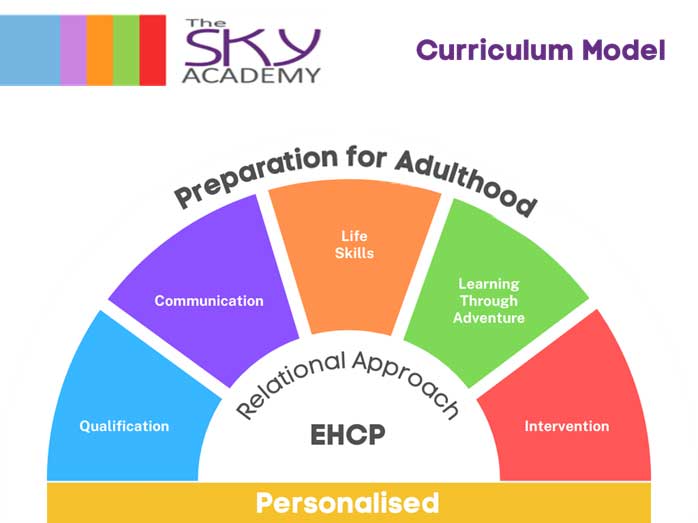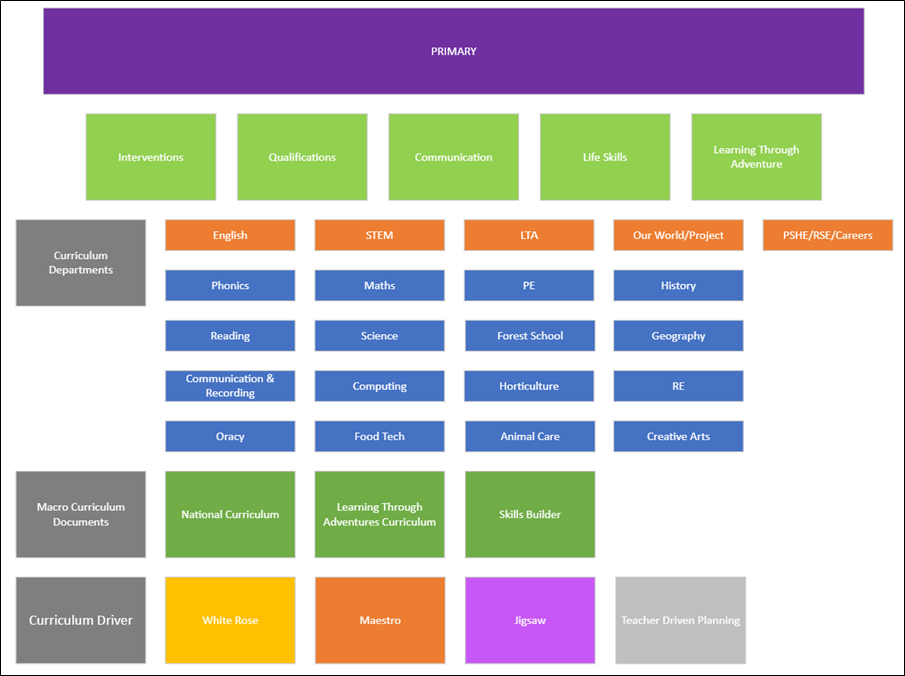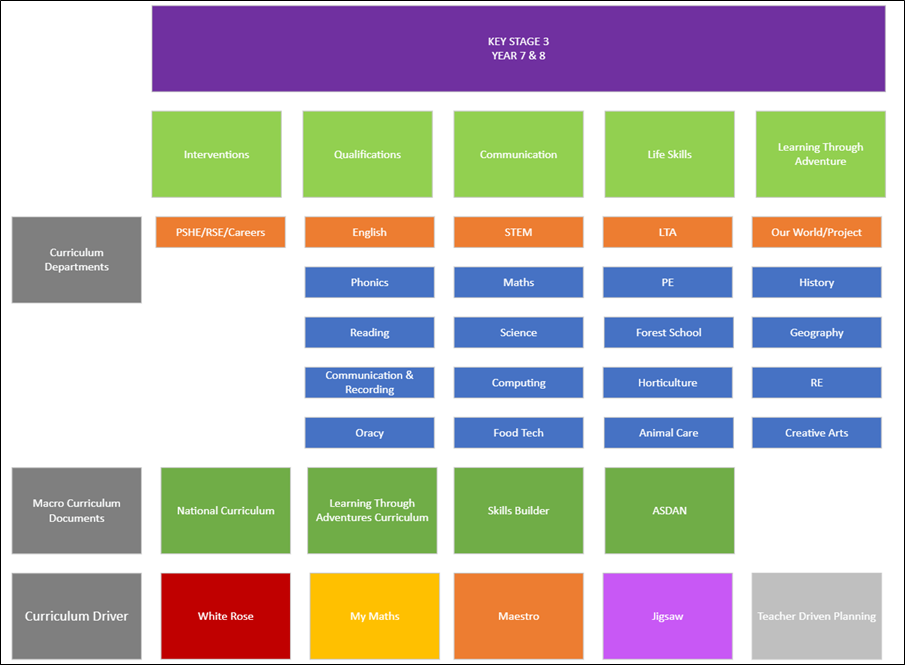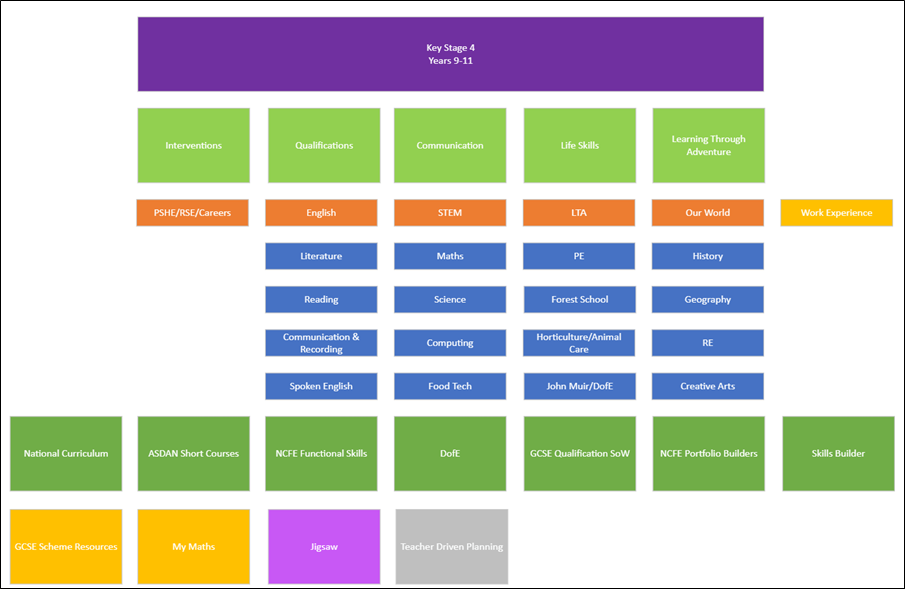Vision and Rationale
Provision of a rich, inclusive learning environment where every learner is empowered to progress and achieve at the highest level, is fundamental to the philosophy at The Sky Academy. The curriculum is the whole learning experience offered by the school. How students learn is as important as what they learn. Student are learning all the time and it is our responsibility to optimise learning opportunities throughout the school day, in curriculum time, during care routines and social times.
Within our established ethos, student will gain confidence in making choices and increase their knowledge and understanding of the world around them. All teachers and professionals engaged in teaching and learning activities will be partners in learning and continuously develop their skills and competencies for providing an appropriate range of strategies to inspire all our learners.
The Curriculum
The aim of our curriculum is that all our young people become:
- Successful students who enjoy learning, make progress and achieve their full potential
- Confident individuals who are able to live safe, healthy and fulfilling lives
- Responsible citizens who (where possible) make a positive contribution to society
We aim to ensure that the curriculum:
- Is broad, balanced and relevant
- Will encourage all students to reach their full potential
- Is flexible enough to meet the needs of the diverse population within the school and matched to the individual needs of the student
- Builds on students’ existing knowledge, skills and understanding.
- Reflects the multicultural nature of the local community and builds on British Values
- Develops confidence, high self-esteem and independence
- Develops a respect for other people and the environment
- Prepares students for the opportunities, responsibilities and experiences of adult life
Methodology
The Sky Academy curriculum takes a multifaceted approach, informed by the latest research and tailored to meet the unique needs of each student.
- Comprehensive Assessment: Transition processes and baseline testing provide a holistic profile of each student’s needs across cognition, learning, SEMH, Speech, Language and Communication Needs (SLCN), and sensory/physical areas. This approach aligns with best practices in SEMH education, ensuring interventions are targeted and effective.
- Needs-Driven Curriculum: The core curriculum addresses the most common needs of our students, forming a strong foundation for learning. We then customise this with evidence-based interventions based on individual assessments. This ensures each student receives the specific support they require to flourish.
- Relational Approach: Our staff utilises the Dan Hughes PACE approach, fostering positive and secure relationships with students. This nurturing environment creates a safe space for learning and emotional growth.
- Classroom Design: Classrooms are thoughtfully designed to minimise cognitive load by providing structure and resources. This allows learners to successfully access learning materials and participate actively.
- Staged Curriculum: The curriculum structure reflects the evolving needs of our students. This ensures that learning activities progress with their developmental stages, promoting continuous growth.
- Blended Provision: Our curriculum pathways offer a unique blend of therapeutic and accredited programmes. This approach personalises the learning experience and supports each student’s desired outcomes.
- We firmly believe communication is a crucial life skill. We integrate communication development throughout all subjects and lessons, fostering strong interaction and emotional intelligence. This focus aligns with best practices in SEMH education, empowering students to communicate effectively beyond the classroom. Targeted support guarantees all students flourish in this essential area.
- TA Expertise: Teaching Assistants have opportunities to become specialists in various intervention fields (cognition & learning, SLCN, SEMH). This broadens personalised learning options and enhances staff satisfaction.
- Our school offers alternative provision (AP) primarily in-house as one of the three curriculum pathways. This programme operates across three specialised bases: Cognition and Learning, Vocational Education (focusing on transition, self-worth, and future success), and Learning through Adventure (emphasising resilience and team building).

Sky Curriculum Intention
At Sky Academy our curriculum is intended to enable our young people to:
- Develop the knowledge, skills and cultural capital they need to succeed in the wider world.
- Overcome the barriers previous adverse experiences may have placed in the path of their personal and academic development
- Become emotionally literate and resilient adults.
Curriculum Structures



Key Principles
- Every class has a designated Key Worker and Teaching Assistant
- Key Stage 2 and 3 taught by way of Primary model
- Key Stage 4 taught by subject specialist staff
- We adapt our educational approach to meet the unique strengths, needs, and interests of each student. This ensures every learner has the opportunity to achieve success.
- We carefully assess student needs through a collaborative Annual Review process. This helps us provide tailored learning opportunities and any necessary support.
- We believe in the power of connecting classroom learning with real-world experiences. Students benefit from access to community resources and programmes that promote the development of essential life skills.
- We provide opportunities for hands-on learning across different contexts. This practical approach helps students solidify their understanding of concepts.
- Our school recognises that some students benefit from additional therapeutic support. We offer resources such as Speech and Language Therapy, Play Therapy, ESLA support, Art Therapy, and Rebound Therapy.
- Lessons are challenging and have pace, rigour and direction for each of the students.
- A range of relevant teaching styles are employed to ensure that we meet student’s individual needs.
- On-going assessment informs planning.
- Student learning progresses smoothly through the school and prepares them for life beyond school.
It is the teacher’s role within the school, through implementing the school’s curriculum strategy and practices, to ensure that they provide a variety of relevant experiences for students in the classroom that serve to develop knowledge, skills and understanding and enable student to value themselves as learners.
Assessment, Record Keeping and Accreditation
Across the school PRISM is used to record students’ working levels and progress made.
Student progress is reported to parents on a number of occasions during the school year. Written information is sent to parents as part of the Annual Review process and an end of year report and assessments are sent to parents in June. For more detailed information please see Assessment Policy.
Monitoring
Monitoring procedures are co-ordinated by the Deputy Head Teacher with appropriate delegation to the Middle Leaders – all are supported by SLT. The quality assurance processes include learning walks, work scrutinises, impact reporting from baseline data and intervention tracking.




